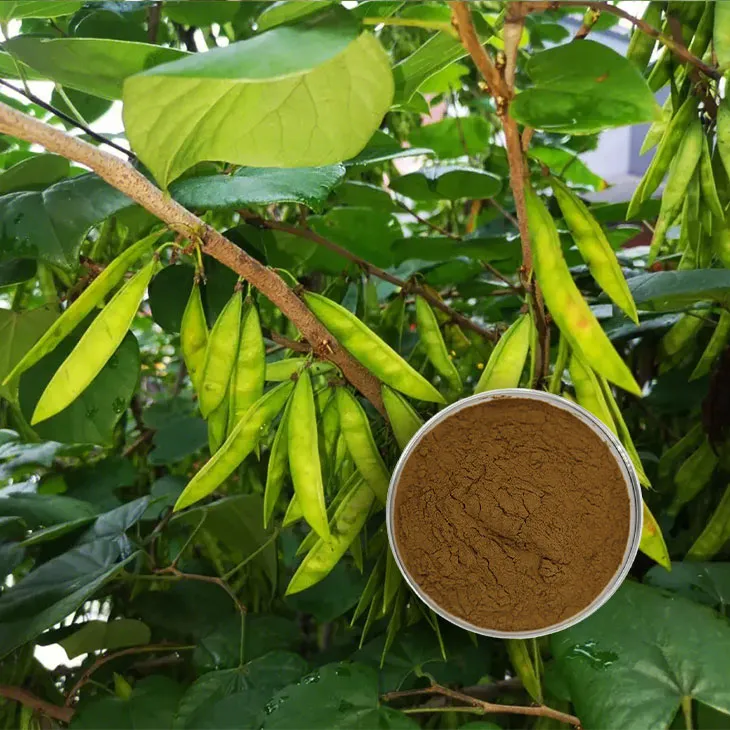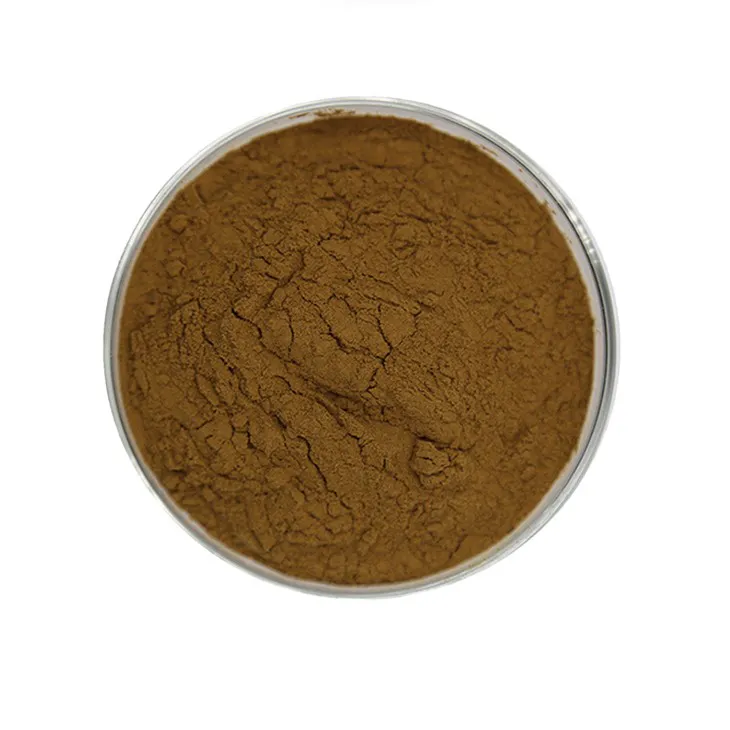- 0086-571-85302990
- sales@greenskybio.com
Organic saponin extract, carbon dioxide extract.
2024-12-21

1. Introduction to Organic Saponin Extract
Organic Saponin Extract has been a focus of scientific research due to its remarkable biological activities. Saponins, which are the key components of this extract, are amphipathic glycosides. Their unique chemical structure allows them to interact with cell membranes in a special manner.
These interactions lead to a wide range of biological effects. For example, the anti - microbial property of saponins can help in fighting against various pathogens. They can disrupt the cell membranes of bacteria, fungi, and viruses, thus inhibiting their growth and replication. In the case of anti - tumor effects, saponins may interfere with the cell cycle of cancer cells or induce apoptosis. Their anti - diabetic effects are also of great importance. They may play a role in regulating blood sugar levels by influencing insulin sensitivity or glucose metabolism.

2. The Advantages of CO2 Extraction for Organic Saponin Extract
CO2 extraction technology has become a favored method for obtaining organic saponin extract. The supercritical CO2 state is crucial in this process.
2.1 Solvating Power
Supercritical CO2 has excellent solvating power. It can effectively dissolve saponins from plant sources. This is because the properties of supercritical CO2 can be adjusted by changing the pressure and temperature, allowing it to mimic the solubility characteristics of different solvents. As a result, it can target and extract saponins with high efficiency.
2.2 Selectivity
Another important aspect is the selectivity of CO2 extraction. It can selectively extract saponins while leaving behind other unwanted components in the plant material. This ensures the purity and quality of the obtained organic saponin extract. By precisely extracting the active saponin components, the final product is more likely to have consistent and reliable biological activities.

3. Applications of Organic Saponin Extract in Different Industries
The organic saponin extract obtained through CO2 extraction has a wide range of applications across various industries.
3.1 Nutraceuticals
In the field of nutraceuticals, the organic saponin extract can be used to develop dietary supplements. These supplements can be designed to promote overall health and well - being. For example, they may be formulated to enhance the immune system, improve cardiovascular health, or provide antioxidant protection. Saponins' anti - microbial and anti - inflammatory properties can contribute to these health - promoting effects. Consumers are increasingly interested in natural products for maintaining their health, and organic saponin extract - based supplements can meet this demand.
3.2 Traditional Medicine
Traditional medicine has a long history of using plants containing saponins for treating various ailments. The organic saponin extract can serve as a basis for modern herbal remedies. It can be used in the formulation of traditional herbal medicines, either in their original form or as standardized extracts. For instance, in some traditional medicine systems, saponin - rich plants are used to treat skin diseases, digestive disorders, or respiratory problems. The scientific understanding of saponins' biological activities can help in optimizing the use of these traditional remedies and ensuring their safety and efficacy.
3.3 Bio - pesticides
In the area of bio - pesticides, saponins offer a natural alternative for pest control. Saponins can have toxic effects on pests, disrupting their physiological functions. They can be used as an ingredient in bio - pesticide formulations to target specific pests while being less harmful to the environment compared to synthetic pesticides. For example, some saponin - based products can be effective against aphids, mites, or certain types of caterpillars. This application aligns with the growing trend towards sustainable agriculture, where natural and environmentally friendly pest control methods are highly sought after.

4. Significance for Natural Product - Based Industries and Sustainable Health Solutions
The combination of organic saponin extract and CO2 extraction technology is of great significance for the development of natural product - based industries and the pursuit of sustainable health solutions.
4.1 Natural Product - Based Industries
For natural product - based industries, the availability of high - quality organic saponin extract obtained through efficient CO2 extraction is a valuable asset. It can enhance the competitiveness of products in the market. Manufacturers can develop a variety of products, such as supplements, herbal remedies, and bio - pesticides, with consistent quality. This can lead to increased consumer trust and market expansion. Moreover, the use of natural saponin extract can also contribute to the branding of products as "natural" and "sustainable," which are highly attractive features in today's market.
4.2 Sustainable Health Solutions
In the context of sustainable health solutions, organic saponin extract offers several advantages. Firstly, it provides natural alternatives to synthetic drugs and chemicals, reducing the potential side effects associated with the latter. Secondly, the sustainable extraction method using CO2 ensures the long - term availability of saponin - rich plant resources. By promoting the use of natural products for health, it also encourages a more holistic approach to healthcare that emphasizes prevention and natural remedies. This is in line with the concept of sustainable development, which aims to meet the present health needs without compromising the ability of future generations to meet their own needs.

5. Challenges and Future Directions
Despite the many potentials of organic saponin extract and CO2 extraction, there are also some challenges that need to be addressed.
5.1 Cost - effectiveness
The CO2 extraction technology, although having many advantages, can be relatively expensive compared to traditional extraction methods. This may limit its widespread application, especially in small - scale production. Future research should focus on optimizing the extraction process to reduce costs while maintaining the quality of the extract. For example, exploring more efficient extraction parameters and equipment designs can potentially make the process more cost - effective.
5.2 Standardization
Another challenge is the standardization of the organic saponin extract. Due to the variability in plant sources and extraction processes, it can be difficult to ensure consistent quality of the extract. Standardization is crucial for product safety and efficacy, especially in the fields of nutraceuticals and traditional medicine. Developing reliable quality control methods and standards is necessary to address this issue. This may involve the identification and quantification of specific saponin components, as well as the establishment of quality specifications for the final product.
5.3 Research on New Applications
While the current applications of organic saponin extract are promising, there is still much room for exploring new applications. Future research could focus on uncovering additional biological activities of saponins and their potential uses in other industries, such as cosmetics or food preservation. For example, saponins may have properties that can be beneficial for skin hydration or anti - aging in cosmetics, or for preventing spoilage in food products. By expanding the range of applications, the value of organic saponin extract can be further enhanced.
6. Conclusion
In conclusion, organic saponin extract obtained through CO2 extraction holds great potential in multiple aspects. Its diverse biological activities make it valuable in various industries, including nutraceuticals, traditional medicine, and bio - pesticides. The advantages of CO2 extraction, such as high solvating power and selectivity, ensure the quality and purity of the extract. However, challenges such as cost - effectiveness, standardization, and exploration of new applications need to be overcome. Overall, the development of organic saponin extract and CO2 extraction technology is an important part of the pursuit of sustainable health solutions and the growth of natural product - based industries.
FAQ:
What are the main biological activities of organic saponin extract?
Organic saponin extract has anti - microbial, anti - tumor, and anti - diabetic effects among others. Saponins in the extract are amphipathic glycosides that interact uniquely with cell membranes, which is responsible for these diverse biological activities.
Why is CO2 extraction a preferred method for obtaining organic saponin extract?
The supercritical CO2 state has excellent solvating power and selectivity. It can extract saponins from plant sources with high precision, thus ensuring the integrity of the active components, which makes it a preferred method for obtaining organic saponin extract.
In which sectors can the organic saponin extract obtained by CO2 extraction be used?
The organic saponin extract obtained via CO2 extraction can be used in multiple sectors. It can be used in nutraceuticals to be formulated into supplements for general well - being. In traditional medicine, it can be the basis for herbal remedies, and in the field of bio - pesticides, it may offer natural alternatives for pest control.
How do saponins in the organic saponin extract interact with cell membranes?
Saponins in the organic saponin extract are amphipathic glycosides. This means they have both hydrophilic and hydrophobic parts. Their unique structure allows them to interact with cell membranes in ways that give rise to their various biological activities, though the exact mechanisms of this interaction are still being researched.
What is the significance of organic saponin extract and CO2 extraction in the development of industries?
They are integral to the development of natural product - based industries. The organic saponin extract has various applications in different sectors as mentioned before. CO2 extraction ensures a high - quality source of this extract, which is important for the growth and sustainability of industries relying on natural products.
Related literature
- The Potential of Saponins in Health and Medicine"
- "CO2 Extraction Technology: Advances in Natural Product Isolation"
- "Saponin - Based Bio - pesticides: A Sustainable Approach"
- ▶ Hesperidin
- ▶ Citrus Bioflavonoids
- ▶ Plant Extract
- ▶ lycopene
- ▶ Diosmin
- ▶ Grape seed extract
- ▶ Sea buckthorn Juice Powder
- ▶ Fruit Juice Powder
- ▶ Hops Extract
- ▶ Artichoke Extract
- ▶ Mushroom extract
- ▶ Astaxanthin
- ▶ Green Tea Extract
- ▶ Curcumin
- ▶ Horse Chestnut Extract
- ▶ Other Product
- ▶ Boswellia Serrata Extract
- ▶ Resveratrol
- ▶ Marigold Extract
- ▶ Grape Leaf Extract
- ▶ New Product
- ▶ Aminolevulinic acid
- ▶ Cranberry Extract
- ▶ Red Yeast Rice
- ▶ Red Wine Extract
-
Mulberry Extract
2024-12-21
-
Lily extract
2024-12-21
-
Angelica sinensis extract
2024-12-21
-
Baicalin
2024-12-21
-
Artichoke Extract
2024-12-21
-
Golden Seal Extract
2024-12-21
-
Coix Seed Extract
2024-12-21
-
Cranberry Extract
2024-12-21
-
Grapefruit Seed Extract Powder
2024-12-21
-
White Peony Extract
2024-12-21





















